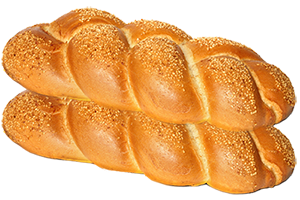The Feast of Shavuot, or Weeks, is one of the “big three” holy days for which all males in Israel were commanded to travel to Jerusalem to attend. It is usually around late May to early June, determined by counting seven weeks (49 days) after the Shabbat of First Fruits (Feast of Unleavened Bread), and then celebrating Shavuot on the 50th day. It is a commanded day of rest and a holy gathering, though cooking is allowed for celebration.
 Traditionally, the Feast of Shavuot is a celebration of the early wheat harvest in Israel, commemorating YHVH’s faithful provision for His people, signified by the command to present two loaves of leavened bread as a tribute. Some maintain that the two loaves represent gratitude for the early harvest and recognition of a promise for a good late harvest to come in the autumn. There is also a tradition of eating dairy and sweets as the people reflected upon YHVH blessings of “a land flowing with milk and honey.”
Traditionally, the Feast of Shavuot is a celebration of the early wheat harvest in Israel, commemorating YHVH’s faithful provision for His people, signified by the command to present two loaves of leavened bread as a tribute. Some maintain that the two loaves represent gratitude for the early harvest and recognition of a promise for a good late harvest to come in the autumn. There is also a tradition of eating dairy and sweets as the people reflected upon YHVH blessings of “a land flowing with milk and honey.”
The Feast of Shavuot is also believed to coincide with the giving of the Ten Commandments and the covenant that YHVH made with the people of Israel at Mount Sinai, which was very likely fifty days after Israel’s departure from Egypt.

In the New Covenant, this day is also known as the Day of Pentacost (a Greek word meaning “fifty”) in which the Holy Spirit came down like fire with a mighty rushing wind, filling the house (the Temple), enabling many people to miraculously speak in foreign languages for the sake of the foreign visitors. The Messiah also instructed his disciples, after His resurrection, to wait in Jerusalem for this miraculous immersion in the Spirit that the Father had promised (Acts 1:4-5).
At ARIEL, the Feast of Shavuot is enthusiastically celebrated with grateful, singing, dancing, a Torah procession and a joyous feast featuring milk and sugar. Ice cream, anyone?
“You shall also count for yourselves from the day after the sabbath, from the day when you brought in the sheaf of the wave offering; there shall be seven complete sabbaths. You shall count fifty days to the day after the seventh sabbath; then you shall present a new grain offering to the LORD. You shall bring in from your dwelling places two loaves of bread for a wave offering, made of two-tenths of an ephah; they shall be of a fine flour, baked with leaven as first fruits to the LORD. Along with the bread you shall present seven one year old male lambs without defect, and a bull of the herd and two rams; they are to be a burnt offering to the LORD, with their grain offering and their drink offerings, an offering by fire of a soothing aroma to the LORD. You shall also offer one male goat for a sin offering and two male lambs one year old for a sacrifice of peace offerings. The priest shall then wave them with the bread of the first fruits for a wave offering with two lambs before the LORD; they are to be holy to the LORD for the priest. On this same day you shall make a proclamation as well; you are to have a holy convocation You shall do no laborious work. It is to be a perpetual statute in all your dwelling places throughout your generations. (Leviticus 23:15-21, NAS)
You can read more about other appointed times of YHVH by clicking here.
